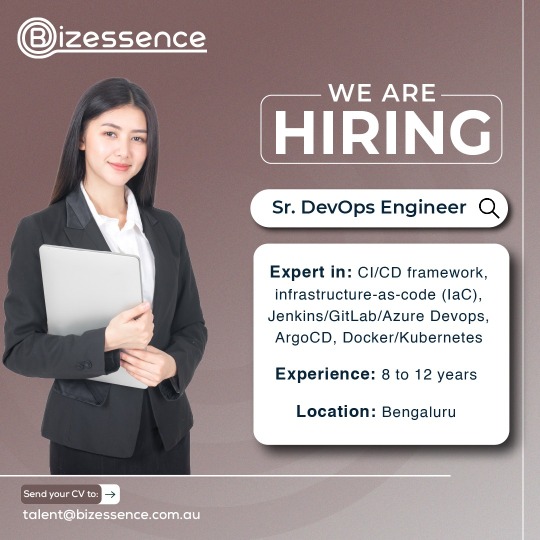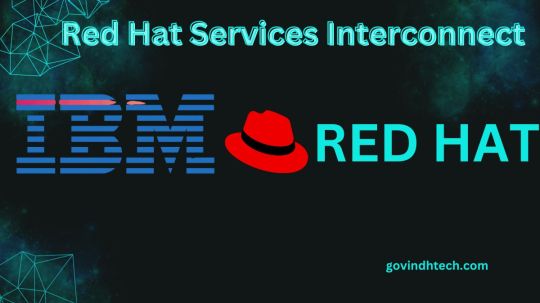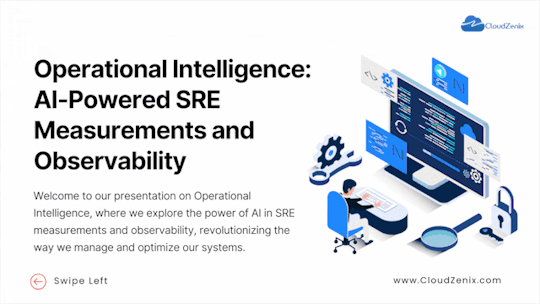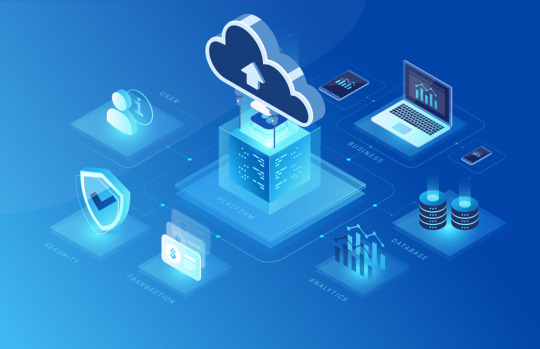#cloudops
Text
The DevOps Pathway Series

View On WordPress
0 notes
Text
WE ARE HIRING Sr. DevOps Engineer
Ready to elevate your DevOps career? We're hiring a Senior DevOps Engineer to join our dynamic team! If you're passionate about optimizing workflows, automating processes, and ensuring seamless deployments. Take your career to new heights and contribute to cutting-edge projects that shape the future of our company.
Apply now - https://bizessence.com.au/jobs/sr-devops-engineer/
Let's build the future together!

#bizessence#devopsengineer#seniordevops#automation#cloudops#docker#continousintegration#sitereliability#jobpost#jobhunt#recruitment#hiringnow#jobsearch#jobvacancy#joinourteam
0 notes
Text
Red Hat Services Interconnect and IBM Hybrid Cloud Mesh

Red Hat Services Interconnect: In order to successfully navigate the complex world of modern enterprise applications, it is necessary for there to be collaboration between various personas in order to effectively manage complexity. Through the use of applications that automate essential workflows, this contributes to the provision of continuous business support.
DevOps and CloudOps have traditionally been aligned with applications and the infrastructure upon which they are hosted. Nevertheless, the emergence of FinOps, which focuses on expense monitoring and control, was brought about by the rising costs that were caused by the diverse IT environments.
Through the use of a variety of personas in application deployment, highly complex workflows have been introduced. DevOps is typically responsible for initiating requests, which are then reviewed by teams from CloudOps, NetOps, SecOps, and FinOps. Because of these intricate workflows, application update times are prolonged, which can occasionally have an effect on business processes and the level of satisfaction experienced by customers.
Red Hat Services Interconnect: An Introduction to the Concept
The goal of Red Hat Services Interconnect (RHSI), which is based on the well-known open-source project Skupper, is to make the hybrid cloud connectivity that applications require more straightforward. It gives the DevOps teams the ability to obtain the connectivity that they require without the need for special privileges or the necessity of relying on complicated VPN connections and specific firewall rules.
A significant acceleration of the application deployment workflow is achieved as a result of this, and business users are able to respond with greater agility to the requirements of their customers. Due to the fact that it does not require any new connections to be made at the infrastructure level, new firewall rules to be added, or ports to be opened, this also contributes to the preservation of the overall CloudOps and SecOps posture.
The technology that lies beneath Red Hat Services Interconnect (RHSI) is responsible for reducing the dependence on the mechanisms of the L3 layer in order to create application tunnels. The use of a virtual private network (VPN) mechanism, such as an IPSec tunnel or any other equivalent tunneling mechanisms at the L3 level, is the primary goal of any L3-based transport. As a result of the fact that these tunnels are going to be provisioned and terminated in the routers that are going to be deployed in the application infrastructure, the NetOps and SecOps teams are going to be the ones to own and provision them.
Alternatively, Red Hat Services Interconnect (RHSI) focuses on the creation of application-level tunnels at a higher layer and employs a well-known messaging infrastructure to transport them at a layer above IP. This is an alternative to IP. A standard application layer messaging protocol that is open to the public is utilized by RHSI. Because of this, the DevOps teams are able to produce L3 tunnels for each application with significantly less reliance on the network layer, which results in a significant increase in their overall efficiency.
RHSI is also deployed as a “in-cluster gateway,” which means that the gateway is deployed as close to the applications as possible. As a result, it is able to develop a greater awareness about the application environment. This is in contrast to traditional routers, which are deployed a significant distance away from the environment in which the application is hosted, and therefore can only provide a limited application awareness.
How the IBM Hybrid Cloud Mesh contributes to the value ofRed Hat Services Interconnect?
Within the realm of the IBM Hybrid Cloud Mesh, there are two major components that serve as the foundation:
A software as a service platform that serves as the management, control, and policy plane (also known as Mesh Manager) a collection of distributed gateways that are deployed in close proximity to application workloads within the application environment (also known as Gateway).
Under the circumstances described above, RHSI fulfills the function of the gateway by putting into action the data plane that is required to transport application traffic between various locations. Outside of the data plane, there are still a great deal of complexities that need to be addressed. Some of these include the management of the gateways’ lifecycles, the rotation of certificates, the administration of policies, and, most importantly, observability.
In addition to ensuring that the DevOps users are given the ability to run faster, the Mesh Manager from IBM ensures that the CloudOps persona maintains the control that they are accustomed to experiencing, but with a significantly reduced amount of effort. Mesh Manager manages a set of distributed RHSI gateways at scale in a seamless manner.
Move forward with Hybrid Cloud Mesh and take the next step
A technology preview of Hybrid Cloud Mesh that supports the use of Red Hat Services Interconnect (RHSI) gateways and simplifies application connectivity and security across platforms, clusters, and clouds is something that IBM are very excited to present. The Red Hat Service Interconnect was introduced on May 23, 2023, during the Red Hat Summit. Its purpose is to establish connections between services, applications, and workloads that are present in hybrid environments that are required.
They are just beginning to develop enterprise hybrid multicloud automation solutions. The Hybrid Cloud Mesh transforms businesses to maximize value from modern application architecture, not just a network solution. This allows hybrid cloud adoption and transforms multicloud use. Looking forward to your company on this journey.
Read more on Govindhtech.com
#RedHat#IBMHybridCloud#CloudOps#FinOps#RedHatServices#HybridCloudMesh#technews#technology#govindhtech
0 notes
Text
0 notes
Text
While the majority of enterprises are moving mission-critical applications and workloads onto the cloud; ensuring a smooth transition from OnPrem to Cloud comes with its own set of challenges. Here, Customer A, one of the largest banks in the mid-western region of the United States, acquired Customer B, a large transportation finance business that was using our product and had an on-premises setup successfully running for many years.
0 notes
Text
Optimize Digital Ecosystems With CloudOps Services
0 notes
Text
Operational Intelligence: AI-Powered SRE Measurements and Observability

The power of Operational Intelligence! AI-driven SRE measurements and observability are revolutionizing the tech world. Leveraging advanced algorithms and machine learning, this innovative approach enhances system performance and detects anomalies in real-time. Read more: https://cloudzenix.in/
#Observability#sre#SiteReliabilityEngineering#SRE#AIinOps#PerformanceMonitoring#DevOps#AIAnalytics#DataDrivenOps#RealTimeMonitoring#InfrastructureMonitoring#DigitalTransformation#AIInnovation#TechTrends#ITOps#DataInsights#ContinuousIntegration#CloudOps#Automation
0 notes
Link
The intelligent software delivery (ISD) automates security checks for attack vectors and eliminates vulnerabilities in your software release and delivery process. This blog provides insights into these attack vectors, corresponding checks and how to apply them.
#CloudOps#DevOps#End-to-End Software Supply Chain#Engineering#Secure Software Delivery#Secure Software Release#Security Breaches
0 notes
Text
Cloudops Solution

Ever felt like your data center's a puzzle with missing pieces? Or maybe your cloud operations feel like you're navigating through fog, uncertain if you're going in the right direction. It's frustrating, right? You're aiming for seamless, but what you get feels more like a bumpy road.
0 notes
Text
ACL Digital, an ALTEN group company, is a design-led Digital Experience, Product Innovation, Solutions, Engineering Services and Digital Transformation leader. It has announced that it has acquired AFour Technologies, a Next-generation 360°-degree software product engineering firm. This acquisition of the AFour Technologies business strengthens ACL Digital's product engineering & Digital offerings and will enable it to accelerate the digital transformation journey for its customers.
ACL Digital is a leader in the digital product engineering space, and this acquisition will further add scale & depth to the digital product engineering portfolio of ACL Digital.
Gerald Attia, Deputy CEO, ALTEN Group, said, "This reinforces ACL Digital’s continued commitment to grow as a premium digital solutions provider helping its customer be future-ready and will strengthen our leadership position in the digital & product engineering space."
"This acquisition helps us expand and strengthen our deep digital product engineering capabilities across various verticals we operate. Together, we will create world-class solutions with AFour Technologies to empower our clients to streamline their operation, enhance their customer experience, compete better in the marketplace, and drive meaningful value to their customers, businesses, and employees,"said Ramandeep Singh, CEO, ACL Digital.
Established in 2007, AFour Technologies (a.k.a. AFour) focuses on Software Product Engineering Services comprising UI/UX Design, Architecture Design and Consulting, Software Development, DevOps (CloudOps, SysOps, and DBOps), QA (Test Strategy and Implementation, Test Automation, Performance, Security), and Monitoring. With an excellent track record of over 10 years and a focus on software product engineering, AFour is a true example of self-belief, consistency, and transparency.
The company is a hub of every innovative technology in software product engineering services ─ Hyper-convergence, SDN, Virtualization, Next Generation Data Center Technologies, Networking, and Enterprise Mobility. The robust talent pool of 400 employees comprising seasoned product and software engineers, who will now join ACL Digital, will drive competitive advantage for our clients with an agile approach to help our customers to become future-ready.
"We are excited to be a part of ACL Digital, a leader in the Digital Product Engineering space. As part of the ACL Digital family, we now have this opportunity to scale, drive growth & deliver customer satisfaction worldwide," said Subodh Parulekar, Co-Founder and CEO, AFour Technologies.
AFour Technologies Co-Founder and MD, Mahesh Kulkarni added, "Our best-in-class Product Engineering and Reliability Engineering Services including Cloud Native Development, Cloud Migration and Enablement, Test Strategy, Security and Performance Testing, DevOps and Test Automation, will ensure delivery of solutions to customers across product lines and industries, with high predictability and reliability."
About AFour Technologies
Founded in 2007, AFour Technologies is a 360-degree software product engineering company headquartered in Pune. As product engineering experts, the company’s mission is to enable its customers to build and maintain resilient, scalable, and secure software systems with high predictability and reliability using agile methodologies. The services offered by the company include product engineering, infrastructure design and configuration management, software prototype development, CI/CD pipeline, DevOps strategy consulting, system architecture design, UX and UI design, backend/API development, performance and security testing, test automation development, and execution. The company employs more than 400 employees and has already serviced over 100 clients in the US.
For more information, please visit: https://afourtech.com/
About ACL Digital
ACL Digital, an ALTEN Group Company, is a digital product innovation and engineering leader. We help our clients design and build innovative products (AI, Cloud, and Mobile ready), content and commerce-driven platforms, and connected, converged digital experiences for the modern world through a design-led Digital Transformation framework. By integrating our strategic design, engineering, and industry capabilities, we help our clients decode the digital world and accelerate their growth journey.
Headquartered in Silicon Valley, ACL Digital is a leader in design-led digital experience, innovation, enterprise modernization, and product engineering services converging to Technology, Media & Telecom. We are a talented workforce and part of the 50,000+ employee ALTEN Group, spread across more than 30 countries, offering a multicultural workplace and a collaborative knowledge environment.
For more information, please visit: https://www.acldigital.com/
0 notes
Text
AWS Cost Optimization Secrets
Navigating the cost structure of Amazon Web Services (AWS) can feel like uncovering the secrets of a hidden treasure. With the right knowledge and strategies, you can optimize your AWS spending, ensuring you’re getting the most out of every dollar spent. In this post, we’ll explore the secrets of AWS cost optimization, providing you with valuable insights to manage and reduce your cloud expenses…

View On WordPress
0 notes
Text
Mastering CloudOps: Optimizing Performance and Driving Innovation in the Cloud

In the dynamic landscape of cloud computing, the effective management and operation of cloud infrastructure have become paramount. This is where CloudOps services come into play. CloudOps services entail the practices, tools, and methodologies employed to streamline and optimize the operation of cloud environments. In this article, we'll delve into the core principles of CloudOps services, their significance in modern IT operations, and their role in ensuring the smooth functioning of cloud-based systems.
What are CloudOps Services?
CloudOps, short for Cloud Operations, refers to the set of practices aimed at managing and maintaining cloud infrastructure, applications, and services efficiently. Unlike traditional IT operations, which primarily focus on on-premises environments, CloudOps is tailored to the unique characteristics and requirements of cloud-based systems. It encompasses various aspects, including provisioning resources, monitoring performance, ensuring security, optimizing costs, and facilitating continuous improvement.
Key Components of CloudOps Services
Automation: Automation lies at the heart of CloudOps. By automating routine tasks such as provisioning, scaling, and configuration management, organizations can achieve greater efficiency, consistency, and scalability in their cloud operations.
Monitoring and Management: Effective monitoring and management are essential for maintaining the health, performance, and security of cloud environments. CloudOps services incorporate robust monitoring tools and practices to proactively identify and address issues before they impact the business.
Cost Optimization: Cloud resources come with associated costs, and optimizing these costs is a critical aspect of CloudOps. This involves rightsizing instances, leveraging reserved instances, implementing cost allocation strategies, and continuously optimizing resource usage to maximize ROI.
Security and Compliance: Security is a top priority in cloud operations. CloudOps services encompass robust security measures, including identity and access management, encryption, network security, and compliance enforcement, to safeguard data and infrastructure from threats and vulnerabilities.
DevOps Integration: CloudOps and DevOps are closely intertwined, with both emphasizing agility, collaboration, and automation. CloudOps services foster seamless integration with DevOps practices, enabling rapid deployment, continuous delivery, and iterative improvement of cloud-based applications and services.
Significance of CloudOps Services
In today's fast-paced business environment, organizations rely heavily on cloud technology to drive innovation, agility, and scalability. However, managing and optimizing cloud resources effectively pose significant challenges. This is where CloudOps services play a crucial role. By adopting CloudOps best practices, organizations can:
Enhance Operational Efficiency: Streamlined processes, automation, and proactive monitoring enable organizations to operate their cloud environments more efficiently, reducing manual efforts and minimizing downtime.
Improve Scalability and Flexibility: CloudOps services empower organizations to scale their infrastructure and applications dynamically in response to changing demands, ensuring optimal performance and resource utilization.
Strengthen Security and Compliance: Robust security measures and compliance frameworks incorporated into CloudOps services help organizations mitigate risks, safeguard sensitive data, and maintain regulatory compliance in the cloud.
Optimize Costs: Cost optimization is a key benefit of CloudOps services, enabling organizations to optimize their cloud spending, identify cost-saving opportunities, and align resources with business priorities.
CloudOps services play a pivotal role in enabling organizations to harness the full potential of cloud technology while ensuring operational excellence, security, and cost efficiency. By adopting CloudOps best practices, organizations can navigate the complexities of cloud operations effectively, drive innovation, and stay ahead in today's digital landscape. As the adoption of cloud computing continues to accelerate, CloudOps services will remain indispensable for organizations striving to thrive in the cloud era.
0 notes
Text
0 notes